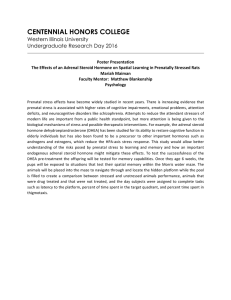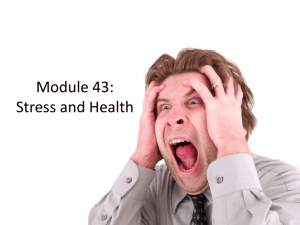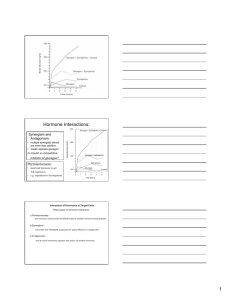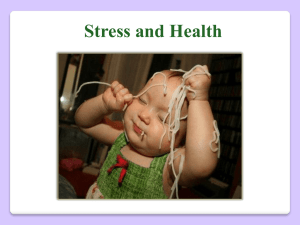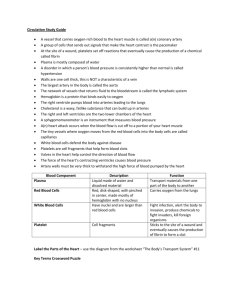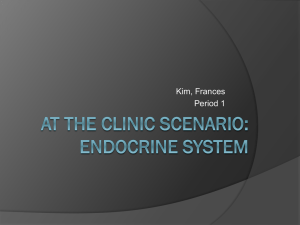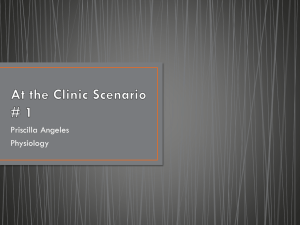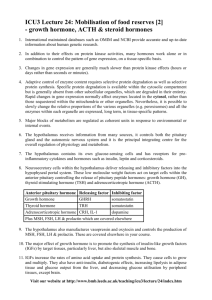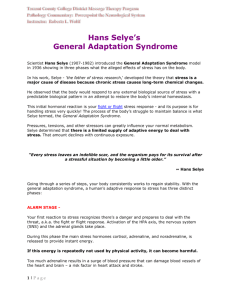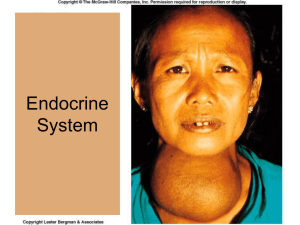CHAPTER 15 - PSYCHOLOGY AND HEALTH
advertisement
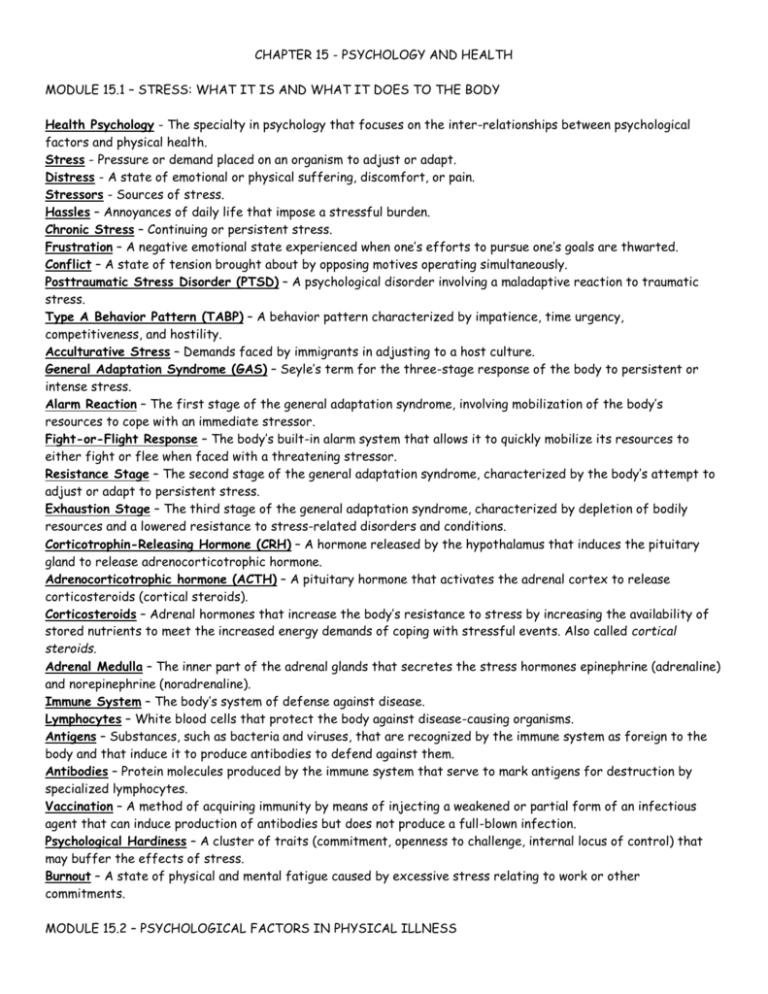
CHAPTER 15 - PSYCHOLOGY AND HEALTH MODULE 15.1 – STRESS: WHAT IT IS AND WHAT IT DOES TO THE BODY Health Psychology - The specialty in psychology that focuses on the inter-relationships between psychological factors and physical health. Stress - Pressure or demand placed on an organism to adjust or adapt. Distress - A state of emotional or physical suffering, discomfort, or pain. Stressors - Sources of stress. Hassles – Annoyances of daily life that impose a stressful burden. Chronic Stress – Continuing or persistent stress. Frustration – A negative emotional state experienced when one’s efforts to pursue one’s goals are thwarted. Conflict – A state of tension brought about by opposing motives operating simultaneously. Posttraumatic Stress Disorder (PTSD) – A psychological disorder involving a maladaptive reaction to traumatic stress. Type A Behavior Pattern (TABP) – A behavior pattern characterized by impatience, time urgency, competitiveness, and hostility. Acculturative Stress – Demands faced by immigrants in adjusting to a host culture. General Adaptation Syndrome (GAS) – Seyle’s term for the three-stage response of the body to persistent or intense stress. Alarm Reaction – The first stage of the general adaptation syndrome, involving mobilization of the body’s resources to cope with an immediate stressor. Fight-or-Flight Response – The body’s built-in alarm system that allows it to quickly mobilize its resources to either fight or flee when faced with a threatening stressor. Resistance Stage – The second stage of the general adaptation syndrome, characterized by the body’s attempt to adjust or adapt to persistent stress. Exhaustion Stage – The third stage of the general adaptation syndrome, characterized by depletion of bodily resources and a lowered resistance to stress-related disorders and conditions. Corticotrophin-Releasing Hormone (CRH) – A hormone released by the hypothalamus that induces the pituitary gland to release adrenocorticotrophic hormone. Adrenocorticotrophic hormone (ACTH) – A pituitary hormone that activates the adrenal cortex to release corticosteroids (cortical steroids). Corticosteroids – Adrenal hormones that increase the body’s resistance to stress by increasing the availability of stored nutrients to meet the increased energy demands of coping with stressful events. Also called cortical steroids. Adrenal Medulla – The inner part of the adrenal glands that secretes the stress hormones epinephrine (adrenaline) and norepinephrine (noradrenaline). Immune System – The body’s system of defense against disease. Lymphocytes – White blood cells that protect the body against disease-causing organisms. Antigens – Substances, such as bacteria and viruses, that are recognized by the immune system as foreign to the body and that induce it to produce antibodies to defend against them. Antibodies – Protein molecules produced by the immune system that serve to mark antigens for destruction by specialized lymphocytes. Vaccination – A method of acquiring immunity by means of injecting a weakened or partial form of an infectious agent that can induce production of antibodies but does not produce a full-blown infection. Psychological Hardiness – A cluster of traits (commitment, openness to challenge, internal locus of control) that may buffer the effects of stress. Burnout – A state of physical and mental fatigue caused by excessive stress relating to work or other commitments. MODULE 15.2 – PSYCHOLOGICAL FACTORS IN PHYSICAL ILLNESS Arteries – Blood vessels that carry oxygen-rich blood from the heart through the circulatory system. Coronary Heart Disease (CHD) – The most common form of heart disease, caused by blockages in coronary arteries, the vessels that supply the heart with blood. Atherosclerosis – A form of arteriosclerosis involving the narrowing of artery walls resulting from the buildup of fatty deposits or plaque. Plaque – In the circulatory system, fatty deposits that accumulate along artery walls. Arteriosclerosis – A condition in which artery walls become thicker and lose elasticity. Commonly called hardening of the arteries. Heart Attack – A potentially life-threatening event involving the death of heart tissue due to a lack of blood flow to the heart. Also called myocardial infarction. Malignant tumors – Uncontrolled growths of body cells that invade surrounding tissue and spread to other parts of the body. Basal Cell Carcinoma – A form of skin cancer that is easily curable if detected and removed early. Melanoma – A potentially lethal form of cancer that develops in melanin-forming cells, generally in the skin but sometimes in other parts of the body that contain these cells, such as the eye. Melanin is the pigment that gives color to the skin, hair, eyes, and some other body parts. Asthma – A chronic lung disease characterized by temporary obstruction of the breathing tubes, leading to attacks of wheezing and difficulty breathing. Migraine Headache – An intense, prolonged headache brought on by changes in blood flow in the brain’s blood vessels. Peptic Ulcers – Sores that form on the lining of the stomach or small intestine. MODULE 15.3 – TAKING THE DISTRESS OUT OF STRESS
